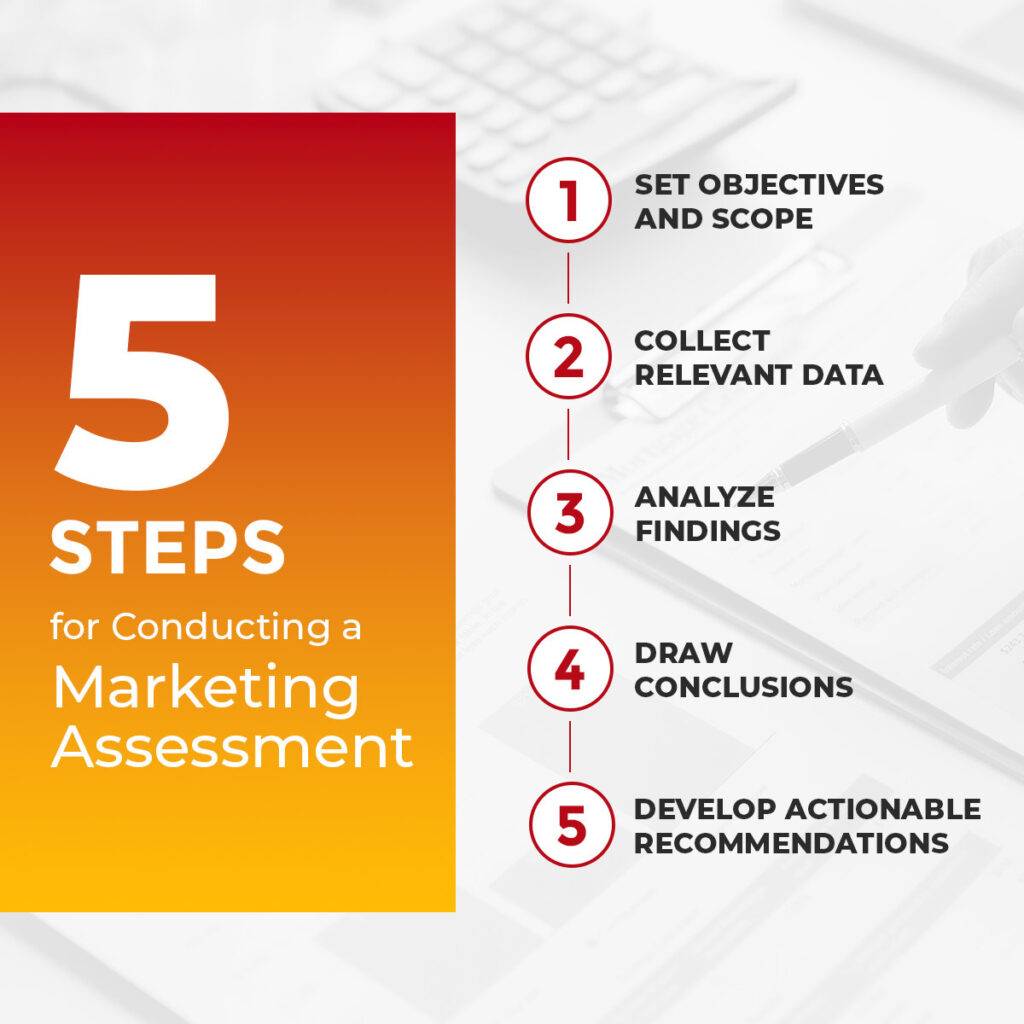Table of Contents
Are you ready to super-charge your company’s marketing? A comprehensive marketing assessment is a great place to start.
Conducting marketing assessments to ensure you stay competitive in your industry is essential. By evaluating your current marketing activities and strategies, you can identify areas that need improvement and develop more effective tactics to reach potential customers. From SEO and paid advertisements to email marketing and social media.
Today, the digital marketing experts at RedShift are tackling various aspects of conducting a thorough marketing assessment, including its importance across different types of businesses, aligning objectives with business goals, the key elements involved in assessments, and customer segmentation methods. We’ll also go over the steps for conducting these assessments, like data collection techniques and actionable recommendations development.
Then, we will discuss how text message marketing can be used to assess your B2B efforts effectively while implementing targeted messaging strategies. Finally, enterprise-level components like brand character identity evaluation and site traffic performance analysis will be covered to ensure a well-rounded understanding of this vital aspect in today’s competitive market landscape.
What Are the Objectives of a Marketing Assessment?
A marketing assessment is only effective when the most important metrics are measured

To stand out in a competitive market, creating a marketing approach that appeals to your target audience while distinguishing yourself from rivals is essential. The best way to get started is with a comprehensive marketing analysis!
Identifying Objectives for the Assessment
Before diving into a marketing analysis, the first step is to identify the key objectives. These may include increasing brand awareness, improving lead generation, or optimizing current marketing activities. Having clear goals in mind will guide your research process and ensure that all findings are relevant to your business plan.
Aligning Marketing Efforts with Business Goals
Aligning your marketing strategies with overall business goals sets you up for long-term success. Let’s say that projected growth in specific markets is a main objective. Then, focusing on those areas during the assessment will provide valuable insights into how best to reach potential customers within those sectors.
Tracking your progress towards these goals is critical. You will use your KPIs to measure metrics like website traffic, social media engagement, and conversion rates over time. This data-driven approach ensures that resources are allocated effectively toward your overarching goals.
How to Choose Objectives
-
- Customer Demographics: Understanding your target audience’s age, gender, and income level will help you create personalized marketing campaigns that resonate with their needs.
-
- Competitor Analysis: Identifying industry trends and competitor strengths/weaknesses will provide valuable insights into potential opportunities for growth.
-
- SWOT Analysis: Conducting a SWOT analysis allows you to evaluate internal and external factors that could impact your company’s success.
Incorporating these elements into your marketing analysis will enable you to develop an effective marketing strategy that drives traffic and converts prospects into leads.
Key Elements Included in Market Assessments
Ensure your analysis contains these elements before you begin collecting data

A comprehensive marketing assessment consists of several key elements that help businesses understand their target audience, competition, and industry landscape. These components are categorized into internal and external factors.
Internal vs. External Factors
Analyzing internal factors involves examining a company’s product development, sales processes, and brand messaging. This process helps identify strengths and weaknesses that will impact the effectiveness of marketing strategies.
On the other hand, an external factors analysis focuses on market size estimation, your competitors, industry trends, SWOT analysis, and other relevant information to stay ahead of competitors.
Customer Segmentation Methods
To better understand potential customers’ needs and preferences, it is essential to segment them based on demographic data such as age group or location. Some common segmentation methods include:
-
- Geographic: Dividing your target audience by region or country allows you to tailor your marketing efforts according to local preferences.
-
- Demographic: Grouping customers based on characteristics like age group or income level helps create targeted campaigns.
-
- Psychographic: Analyzing consumers’ lifestyles, interests, attitudes, values, and opinions enables more personalized engagement with your target audience.
In addition to these key elements mentioned above, KPIs need to be established during your assessment. This allows for adjustments and optimization for future initiatives where necessary,
By conducting a thorough marketing assessment, your business will develop more effective marketing strategies that resonate with your target audience competitors. This process also helps companies identify areas for improvement in their current marketing activities and make data-driven decisions to optimize future campaigns for maximum ROI (return on investment).
Steps for Conducting a Marketing Assessment
Ready to get started? Follow these steps to success
Want to evaluate your marketing strategies properly? Follow our steps to align your future campaigns.
1. Set Objectives and Scope
Define what you want to achieve and the scope of your assessment. This sets the foundation for accurate data collection and analysis.
2. Collect Relevant Data
Use research methods like polls, surveys, focus groups, and social media analytics tools to gather valuable insights on your target consumers.
3. Analyze Findings
Use the data collected to identify areas for improvement in your marketing strategies. Analyze trends in engagement metrics and your potential customer reach.
4. Draw Conclusions
Based on your analysis, draw conclusions about the effectiveness of your current marketing activities and identify ways to improve your efforts.
5. Develop Actionable Recommendations
Use your conclusions to develop actionable recommendations for optimizing your current marketing activities and planning future initiatives.

Data Collection and Analysis Techniques
-
- Polls and Surveys: Use online survey platforms like SurveyMonkey or Qualtrics to gather quantitative data from your target audience.
-
- Focus Groups: Conduct small group discussions to uncover deeper insights into customer motivations and pain points.
-
- Social Media Analytics Tools: Use tools like Hootsuite or Sprout Social to monitor conversations around your brand on social media channels.
Developing Actionable Recommendations
-
- Brand Messaging: Ensure your brand messaging is consistent across all marketing channels and resonates with your target audience.
-
- Lead Generation Strategies: Identify which lead generation tactics are most effective in driving qualified leads and adjust your marketing budget accordingly.
-
- Social Media Presence: Evaluate how well you are engaging with potential customers on social media platforms. Identify gaps in content strategy or frequency of posting and make necessary adjustments for better results.
By conducting a comprehensive marketing analysis, you can evaluate your current marketing efforts, pinpoint areas for improvement, and create more effective marketing strategies that drive growth and success in today’s competitive marketplace.
Enterprise-Level Marketing Assessment Components
To assess the marketing efforts of a major company, there are a few more steps you need to take
Enterprise-level marketing analysis goes beyond evaluating promotional tactics and encompasses a company’s assets and activities. This comprehensive analysis is important for identifying areas of optimization and potential growth opportunities in the ever-evolving marketplace. The two top components of enterprise-level marketing assessments are brand character identity evaluation and site traffic performance analysis.
Brand Character Identity Evaluation
An effective brand character identity resonates with your target audience, differentiates you from competitors, and fosters customer loyalty. The assessment process should include an examination of your current brand messaging, visual elements, tone, and consistency across various channels. Here’s how you can get started:
-
- Determine purpose/objectives.
- Analyze internal/external factors affecting performance.
- Evaluate key performance indicators (KPIs).
- Segment customers based on demographics/behavior.
- Collect data using various analytics tools.
- Identify strengths/weaknesses/opportunities/threats (SWOT).
- Create actionable recommendations aligned with business goals.
A comprehensive marketing analysis is a must-have for businesses that want to improve their marketing game and stay ahead of the competition. By conducting regular marketing analysis, you will keep your finger on the pulse of your industry & competitors. Without regular comprehensive assessments, you will likely begin falling behind on your marketing efforts.
So, if you want to take your marketing efforts to the next level, start with a comprehensive marketing assessment from RedShift. Our team of digital marketing experts will conduct a comprehensive assessment of your brand, set KPIs, analyze the data, and make recommendations based on our combined decades of experience.
What are you waiting for? RedShift has the power to supercharge your marketing efforts! Work with us to get the best possible results for your next marketing campaign.
-
- Determine if the existing branding aligns with your business plan: Ensure that your branding accurately reflects the values you want to convey to potential customers.
-
- Analyze industry trends: Stay ahead by understanding how other players in the market position themselves.
-
- Evaluate competitor positioning: Identify unique selling points that set you apart from competitors and use these insights when crafting targeted campaigns designed for lead generation.
A thorough review of website traffic performance across different digital channels will provide valuable insights into user behavior patterns and areas requiring optimization. You can use advanced analytics and diagnostic tools to:
-
- Measure KPIs: Track metrics such as bounce rates, conversion rates, or average session duration to gauge your marketing efforts.
-
- Analyze user behavior: Understand how visitors interact with your website by examining click-through rates on specific pages or tracking time spent browsing particular sections.
-
- Evaluate SEO strategies: Assess whether current search engine optimization techniques drive desired results by analyzing organic traffic growth rate and keyword rankings.
Incorporating these components into an enterprise-level marketing assessment allows for a comprehensive understanding of your company’s strengths and weaknesses. This knowledge will empower you to make data-driven decisions that optimize your marketing strategies for maximum impact on your target audiences.

